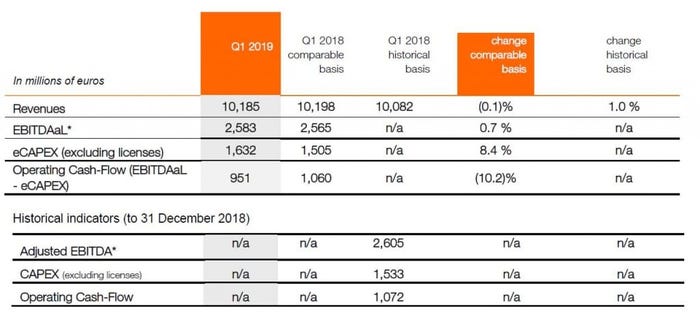A weak France overshadowed Orange’s Q1
The telecom operator Orange reported a flat Q1, with a weak performance in its home market partially compensated by the strength in Africa and the Middle East.
April 30, 2019

The telecom operator Orange reported a flat Q1, with a weak performance in its home market partially compensated by the strength in Africa and the Middle East.
Orange reported a set of stable top line numbers in its first quarter results. On Group level, the total revenue of €10.185 billion was largely flat from a year ago (-0.1%), and the EBITDAaL (earnings before interest, tax, depreciation and amortisation after lease) improved by 0.7% to reach €2.583. Due to the 8% increase in eCAPEX (“economic” CAPEX), the total operating cash flow decline by 10.2% to €951 million.

Commenting on the results, Stéphane Richard, Chairman and CEO of the Orange Group, said that “the Group succeeded in maintaining its high quality commercial performance in spite of a particularly challenging competitive context notably in our two principal countries of France and Spain. Our strategy is paying off since EBITDAal is continuing to grow while revenues remain stable, allo wing us to reaffirm our 2019 objectives”
On geography level, France, its home and biggest market is going through a weak period. Despite registering net gain in the number of customers, the total income dropped by 1.8% to €4.408 billion, the first quarterly decline in two years. The company blamed competition, a one-off promotion of digital reading offer towards the end of the quarter, and “a weaker performance on high-end equipment sales in the 1st quarter of this year”. The move to “Convergence” was positive, but not fast enough to offset the lose in narrowband customers. The competition pressure is still visible. The Sosh package (home broadband + mobile) Orange rolled out to combat Free is gaining weight among its broadband customers, which resulted in a decline of revenues despite the growth in customer base.
Orange’s European markets, including Spain and the rest of Europe, reported modest growth, with strength in Poland (+2.6%) and Belgium & Luxembourg (+3.8%) offset by a weaker Central Europe (-1.9%). The bright spot was Africa and Middle East, which registered a 5.3% growth to reach €1.349 billion revenue, taking the market’s total revenue above Spain and just marginally behind the rest of Europe. The company’s drive to extend its 4G coverage in Africa is paying off, with mobile data service contributing to 2/3 of its mobile growth. Orange Money also saw strong enthusiasm, with the revenue up by 29% and total number of monthly active users totalling 15.5 million.
Both the Q1 results and outlook to the rest of the year spelled mixed messages for the wider telecom market and Orange’s suppliers, but negatives look to outweigh positives. On the consumer market side, the slowdown of high-end smartphone sales and prolonged replacement cycle has once again been demonstrated in the weak numbers in France. On the network market side, Orange predicts more efficiency. This includes both the network sharing deal signed with Vodafone Spain, which is expected to deliver €800 million savings over ten years, and an overall reduction in CAPEX this year.
As the CEO said, “while the level of eCapex for this quarter is higher, it should reduce slightly for 2019 as a whole, as predicted, excluding the effect of the network sharing agreement with Vodafone in Spain announced on 25 April.” This means, to achieve the annual target of reduced CAPEX, the spending will drop much faster in the rest of year. There is no timetable to start 5G auction in France yet, but it will be safe to say that any expectations of 5G spending extravaganza will be misplaced.
On the positive side, Orange has seen its efforts to diversify its business gaining traction, especially in IoT and smart homes. But these areas, fast as the growth may be, only make a small portion of Orange’s total business.
About the Author
You May Also Like





.png?width=300&auto=webp&quality=80&disable=upscale)




.png?width=300&auto=webp&quality=80&disable=upscale)


_1.jpg?width=300&auto=webp&quality=80&disable=upscale)